Maths Challengers!
Yesterday, four of our wonderful Year 5 mathematicians went to Allerton Grange to compete in their Maths Challenge. It was a full day of events which consisted of 4 different rounds. The children enjoyed themselves and even placed THIRD with a whopping 135 points. Well done to Evan, Ehtasham, Danny and Kian!
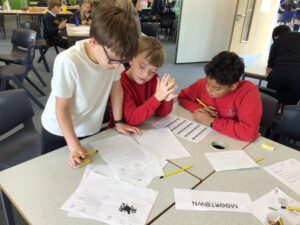
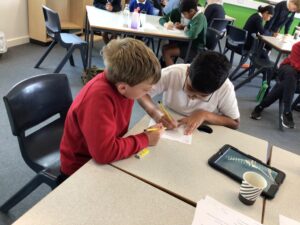
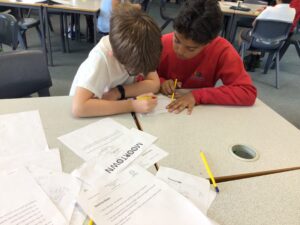
Being healthy themed week: staff vs pupils netball
At our final netball after-school club, and as it is our being healthy themed week, we enjoyed a hard fought match between the pupils and staff.
The children have progressed really well with their netball skills this term and we hope the Year 6 netballers continue to enjoy this sport as they move to high school.









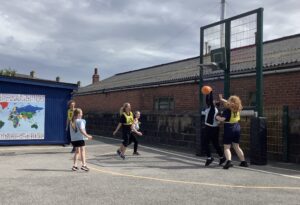


Being Healthy themed week 10 July
Our next whole school themed week, based around Being Healthy, will be taking place from Monday 10th July. This is the second of two themed weeks in the year.

Leeds Discovery Centre Trip
Yesterday, Year 5 went to Leeds Discovery Centre to take part in an Ancient Egyptian workshop. The children were able to touch artefacts, design their own Egyptian town and create a self portrait (in the style of hieroglyphics).
The children were amazed by the fascinating Leeds Discovery Centre store, which holds over 1 million artefacts. We were able to look at a range of different items from the past; we were even able to touch moon rock and look at a meteorite!

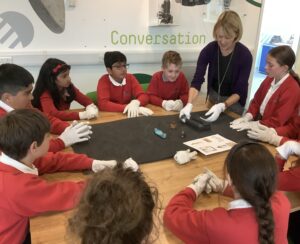




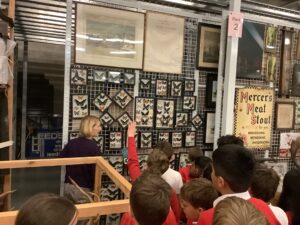

Help at home: Discuss something they have learnt, their favourite part of the day or a question they now have about Egyptian life.
Living and Learning: Body Image
This week in Living and Learning, we talked about what body image is and what might influence it.
The children created a variety of definitions but in the end all agreed that ‘Body image is our idea of how our body looks and how we think it looks to others. This can include our feelings and thoughts about our height, weight, shape, skin colour, appearance or attractiveness’.
We then went on to discuss potential influences. Here are the ones we thought of:
- Social Media
- TV
- Celebrities
- Friends
- Family
- News
- Ourselves
- Fashion
- Experience (e.g. sports clubs, school, parties)
Help at home: Discuss how each of the influences might impact our body images.
Living and Learning: Relationships
Over the past 3 weeks, we have had a plethora of RSE lessons covering a range of topics. This week, we talked about relationships and what makes them healthy as well as families and what makes ours different and unique.
To start, we defined a relationship as “the way in which two or more people or things are connected, or the state of being connected” and then talked about the different relationships we have in our lives. Then, we discussed healthy and unhealthy relationships and thought about how we could support and improve them. Here are a few ideas:
- being kind, considerate and respectful
- being honest
- listening to each other
- respecting personal space, boundaries and privacy
- accepting others’ differences
We then talked about similarities and differences between our families and focused in our why our families are important to us. Here are a few responses. Families provide:
- love
- care
- support
- food
- shelter
- safety
Help at home: Talk with your child about the different relationships they have.
Allerton Grange: Inter-Primary School Sports Day
This week, 32 of our Y5s and Y6s took part in an inter-primary school sports day at Allerton Grange High School.
Events included; obstacle, relay, sprint, 1/2 lap, a full lap and more! Everybody tried their best and had lots of fun!
Well done to everyone for finishing fourth, too!
Here are some pictures of us in action!



Production – Porridge!
Hi everybody!
Please make sure you bring your costumes and props outlined in last week’s letter to school no later than Monday 26th June. If you don’t have any of the items listed for your role, please let an adult in Y5 or 6 know before this Friday.
Keep practising your lines at home and get into the character you are portraying!
Thanks everyone!
Living and Learning: Physical Health
We have been talking in Living and Learning lessons about how physical activity can help our physical health as well as our mental health. Firstly, we defined physical wellbeing/health as ‘looking after and feeling good in your body’ and mental wellbeing/health as ‘looking after and feeling good in your mind’.
We then discussed how partaking in physical activity releases chemicals into our brains to make us feel good. We also learnt that when we exercise we have more energy which then means we can concentrate more.
Help at home: Try out a new sport or type of physical activity over the half term.
Basketball
City of Leeds Basketball, who provide our after-school basketball clubs, have a range of sessions for children of all ages.
Visit their website to book.
